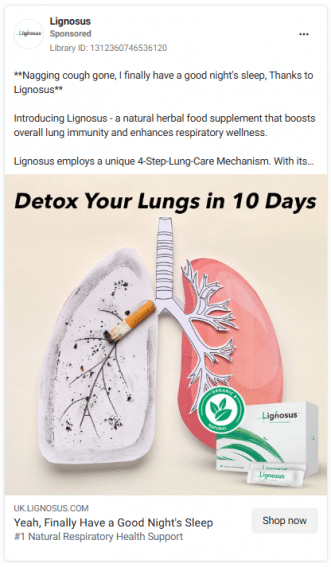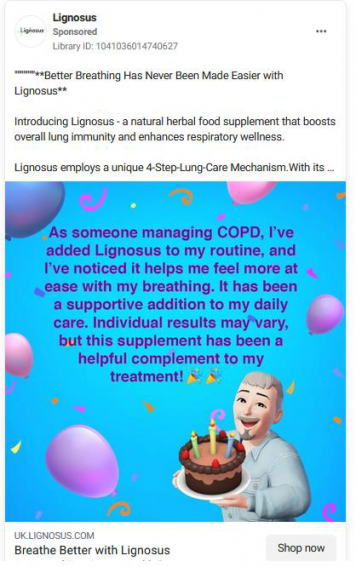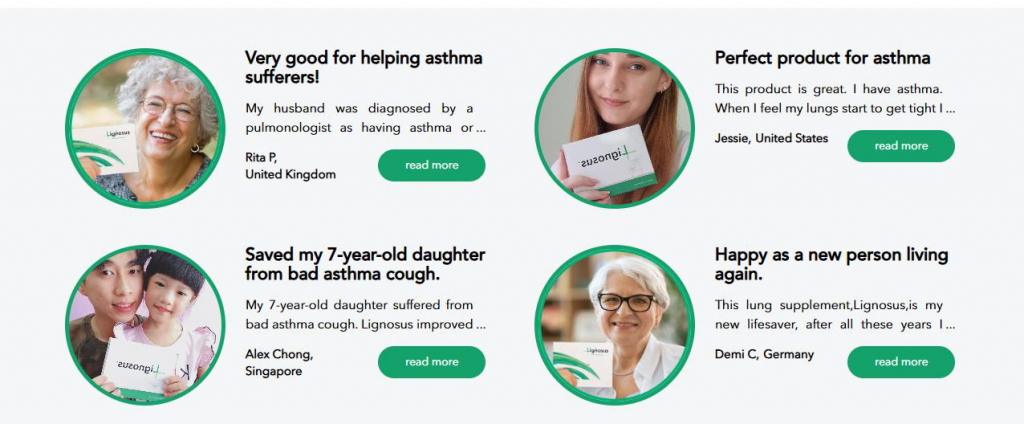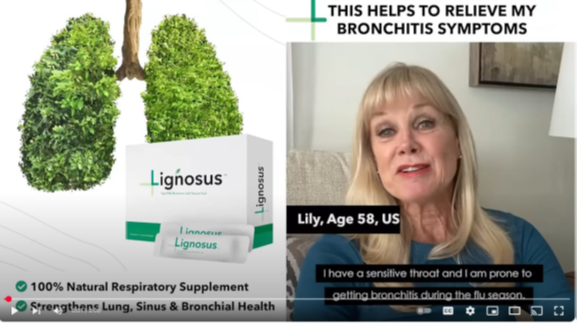As anyone who suffers from respiratory allergies and sinus conditions will know, the winter cold and flu season in the UK is no fun. Fortunately, help is on hand, in the form of a Facebook ad for new health supplement, Lignosus – a small pouch of mushroom gel that you pour into your drink to experience all manner of health benefits. As one Facebook ad put it, “To Anyone Struggling with Winter Breathing: Lignosus is for You”.

Lignosus – whose products start at £45 for a month’s supply of their supplement sachets – claim to be “the natural herbal food supplement specially designed to support your lungs during the cold winter months”, combining “centuries-old herbal wisdom with modern innovation to deliver a groundbreaking 4-Step-Lung-Care Mechanism that works holistically to restore your respiratory health”.
Rather unusually for a Facebook ad, the accompanying click-to-expand copy was 300 words long, containing no fewer than 18 emojis and three testimonials from “happy customers”. Their delight wasn’t just in fighting off winter infections – Daniel P talked of his experience as “someone with chronic sinus issues”, and Emma T explained how she dreads winter, due to her asthma.
Worryingly, among the emoji-punctuated ad copy included claims that Lignosus “Supports Lung Detoxification”, “Enhances Respiratory Wellness”, and “Provides Natural Asthma & COPD Support”.
Asthma and COPD (chronic obstructive pulmonary disease) are common but serious conditions. In the last decade, 12,000 people in the UK have died from asthma – that’s a rate of three per day. Similarly, according to the WHO, 3.5 million people died worldwide from COPD in 2021, making it the fourth leading cause of death worldwide. These are not conditions that products ought to claim to treat without good evidence, as persuading people to forego their regular medication can have dire consequences.

Troublingly, that is literally what Lignosus’ advertising claims have done. In a second ad – which depicts the lungs as an ashtray with a stubbed-out cigarette, under the header “Detox Your Lungs in 10 Days” – the 1,000-word expanded ad copy includes more reviews from happy customers:
James P: “Ever since I embarked on my journey with Lignosus three months ago, the transformation in my health has been nothing short of remarkable. My asthma symptoms, which once dictated my daily life, have seen a significant reduction. What’s more, I’ve found myself reaching out for my inhalers far less frequently. It’s evident that with patience and consistent use, Lignosus has been a cornerstone in my path to better respiratory health.”
Jean M: “My husband’s battle with emphysema and COPD has been a long and arduous one, made even more challenging post his accident. However, since we introduced Lignosus to his daily regimen, there’s been a palpable shift in his well-being. Beyond the undeniable respiratory benefits, the support and guidance from the Lignosus team have been a pillar of strength for us.”
Susan M: “COPD has been a constant companion in my life, bringing along its myriad challenges. But with Lignosus, I’ve rediscovered the joy of deep, unhindered breaths. Within mere days of starting, the improvement in my oxygen levels was evident. Each day feels brighter, and I attribute this positive change largely to Lignosus.”
Other reviews talks about how “Having suffered from chronic asthma, this product has been a revelation” and “my breathing and the reduction in mucus from my lungs have been noticeable” and “I consistently register an oxygen level above 97. Lignosus has been a key factor in this positive change” And “I’ve recommended it to many, and even my lung rehab clinic is now suggesting it to patients.”

Among the 79 other Lignosus ads listed as active in the Facebook Ad Library are designs that mimic posts from users, with cartoon avatars and celebratory balloons, but with text that reads:
As someone managing COPD, I’ve added Lignosus to my routine, and I’ve noticed it helps me feel more at ease with breathing. It has been a supportive addition to my daily care. Individual results may vary, but this supplement has been a helpful complement to my treatment!
The intent here, clearly, is to ensure that the casual Facebook user associates the ad with an organic opinion from one of their connections, adding authenticity to what is otherwise a concerning marketing claim. Another similarly designed ad proclaims:
“I’m a 20+ year smoker. Lignosus cleared out my lungs in 7 days.”
There is no evidence that Tiger Milk Mushroom – the extract at the heart of the Lignosus product – can clear lungs of smoking damage within seven days, or improve oxygen levels for COPD patients in a similar timeline. Nor is their evidence that their product is “Anti-inflammatory, Anti-asthmatic, Anti-Tumor(sic), Antioxidant, Anti-Microbial, Anti-Illness”.

Lignosus’ website and marketing materials regularly claim their products can treat conditions including asthma, chronic cough, chronic bronchitis, sinusitis, nasal sensitivity, respiratory allergies, snoring, COPD, and weak lung function, and that the mushroom supplements are “Guided by science and powered by nature”. They even provide references to support that claim of being science-guided – specifically, a 2021 paper in Scientific Reports, titled: “Effect of tiger milk mushroom (Lignosus rhinocerus) supplementation on respiratory health, immunity and antioxidant status: an open-label prospective study.”
As the title suggests, this is not a double-blinded study, nor is it even placebo controlled. It involved 50 patients, all of whom met the selection criteria of:
participants with no background of chronic respiratory disease, non-smokers and not undergoing any supplementation targeting respiratory health.
Lignosus’ claims that their product can help treat COPD and asthma are based on an observational study conducted in exclusively healthy people. What’s more, the participants were all given oral supplementation of TigerPro™, a Tiger Milk Mushroom product from Nexus Wise – the company are thanked for their support in the acknowledgements of the study.
Misleading marketing

The over-reliance on a single unconvincing study is not the only concerning aspect of Lignosus’ messaging. Upon visiting their site, users are met with a range of pressured sales tactics. A popup offers a discount code for subscribing to their email list. The call-to-action button on the signup form?
“Yes. I want stronger lungs!”
But wait, don’t act just yet, because once you’re signed up to the mailing list, a further pop-up ad offers to increase your discount if you sign up to their SMS club – for a 15% discount, you can opt in to regular sales pushes directly to your phone number.
Scrolling around the Lignosus website, it’s impossible not to notice the ticker that keeps appearing in the bottom left of the page, advising you of yet another sale in your area. “Catherine in Wishaw, United Kingdom purchased Lignosus | Best Natural Respiratory Health Supplement”, it reads, before disappearing. A moment later, it is replaced by another satisfied customer, this time Helen in Cambridge has made the same purchase, a moment later, Chris in Brentwood followed suit.

The impression is clear: Lignosus is selling fast.
However, upon inspecting the source code for the page, those real-time sales may not be as cut and dry: those pop-up messages come courtesy of a module called “fomo-notification”. If these are indeed genuine purchases, in real time, the intent remains clear: to instill in the user a “Fear Of Missing Out” on this wonder supplement.

Many of Lignosus’ most eye-catching health claims are delivered in the form of testimonials from their happy customers – such as those cited in the lengthy copy of those Facebook ads. Lignosus even proudly asserts that their products are about “Real people, real results”:
Over 600,000 people worldwide have achieved stronger respiratory health with Lignosus.
Trusted by hundreds of thousands worldwide, Lignosus offers the leading natural solution for lung health.
Some of those hundreds of thousands of happy customers tell their story on the Lignosus website, such as Rita P, who can be seen smiling and holding up the Lignosus box, while telling us:
My husband was diagnosed by a pulmonologist as having asthma or possibly COPD. He was given a prescription for a steroid inhaler. After 4 days, his symptoms were so bad he had to stop taking this medication. When he started on Lignosus, it took close to three weeks but he did stabilize and did not use the inhaler at all.
Demi C from Germany, too, had a story to tell, about how she was “happy as a new person living again”, thanks to Lignosus:

Both ladies appear across the internet – Rita P, for example, can be found at Brain Harmony.com, where she doesn’t recommend that COPD patients give up their steroid inhalers – instead she explains that a car accident left her with balance and coordination issues, until Brain Harmony helped her get back to her Zumba class. There, she goes by ‘Susan’. Elsewhere, she crops up on the default website of a car dealership, Moto Novo Finance, where she was called “Joe Bloggs” and her testimony read “Lorem ipsum dolor sit amet…”. Rather unsurprisingly, both Rita and Demi are actually stock images from Shutterstock:

Even Lignosus’ many video testimonials may not be all as they seem. The company shares 10 customer testimonials, featuring product reviews from well-lit and charismatic customers like Tiffany, Age 36.

An image search online shows Tiffany advertising a different herbal supplement, this time under the name Amber.

Similarly, 58-year-old bronchitis sufferer Lily’s testimonial video looks an awful lot like the work of an actress who appears in testimonials for a wide range of other herbal and natural health products.
Perhaps Lily and Tiffany are merely prolific users of herbal supplements, and enthusiastic in their advocacy. Perhaps Rita and Demi were shy, or unwilling to supply real photographs to accompany their testimonials. It is possible that there is nothing untoward going on; it is also possible that video endorsements that offer Lignosus such credibility are merely undeclared advertising from paid actors.
A dystopian twist
While there are serious questions to ask of Lignosus’ user testimonials high-pressure marketing techniques, the company is not the only culprit in the misleading marketing of this would-be miracle supplement. Users who do pause to check the veracity of the health claims made by Lignosus might understandably turn to Google for external sourcing and corroboration. Users who do so will be prompted by Google’s first autosuggestion, “Lignosus NHS” – the results for which include (earlier this month, at least), in order:
- A news item from NHS Royal Brompton and Harefield hospitals: “First UK patients get pioneering new treatment for serious lung disease”
- Google’s “People also ask” suggestion box
- A page from NHS UK: “Living with chronic obstructive pulmonary disease”
- A news item from NHS Guy’s and St Thomas’ NHS Foundation Trust: “New hope for patients with severe lung disease”

Any reasonable user might conclude from this set of results that NHS Royal Brompton and Harefield hospitals and NHS Guy’s and St Thomas’ NHS Foundation Trust are trialling the use of Lignosus for COPD, and that the product is seen as a “pioneering new treatment” that can offer “new hope”.
However, the NHS does not recommend Lignosus. In fact, none of those top three pages for the search term “lignosus NHS” actually mention Lignosus. Instead, they are coverage of promising clinical trials involving the use of electrical stimulation of the bronchus in the lungs of COPD patients, and the provision of at-home ventilators.
Why do these unrelated news items appear when users search for information on Lignosus? Google’s search algorithm is famously opaque, but it is highly likely due to the use of AI tools to scan and understand the types of claims associated with the Lignosus product, and a search that returns results from a cluster of semantically related terms. The effect of which, therefore, was that Google read the claims made by Lignosus on their own website, took them at face value, and presented users with search results that were based on the assumption that those health claims were true.
In many ways, this is the opposite of what a search engine is for.
Worse still, upon expanding the “People also ask” suggestion “Does Lignosus actually work?”, users would have been greeted with a paragraph of text explaining that “Some users who have smoked for years have reported that Lignosus has helped them to detox their respiratory system and improve their breathing” and “Some users who have smoked for years have reported that Lignosus has helped them to detox their respiratory system and improve their breathing.”
Once again, a reasonable user would assume that Google is returning a summary of a range of sources, that independently agree on the efficacy and effectiveness of Lignosus. However, this is not the case – the summary, created by Google’s AI, is merely paraphrasing the testimonials on the Lignosus website. Those testimonials from stock images like “Rita” and “Demi”, and from probably actors like “Lily” and “Tiffany”.
It is worth considering, at this point, how any reasonably user is meant to understand whether Lignosus actually does what it claims – from their lengthy ads on Facebook designed to mimic the posts of their friends, to their polished video testimonials, their claims of scientific backing, and their FOMO-based pressured sales nudges.
And when turning to the wider internet for corroboration or independent analysis, users are met instead with Google’s AI effectively working on behalf of Lignosus, to reassure users that what Lignosus and their testimonials claim is probably true.
On the receiving end of all of this are patients with asthma and COPD who are being persuaded to give up their inhalers and effective medication, in favour of a promised miracle cure that can clear up their symptoms in a week. For long term smokers, promised a “7-day lung detox”, the worst-case scenario may only be wasted time and wasted money.
However, patients with asthma and COPD who don’t carry their inhalers and take their medication are at vastly higher risk of a respiratory attack that could prove lethal. We can only hope that never happens happen, because we can be sure that if such an incident takes place, it will never appear in a Lignosus testimonial, nor in Google’s reassuring paraphrasing of what Lignosus has to say.






